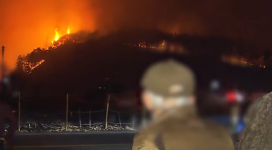
A man from a tribal animistic village in Oaxaca, Mexico abandoned the traditions he grew up with and gave his life to Christ despite great persecution from other tribal members.
Reynaldo said he had followed the animistic rituals for years but did not really understand why he did them.
"In many cases I didn't even know why I was doing the animist rituals, except 'to not anger the spirits,' and a life full of doing that never fulfilled me," he said, according to Christian Aid Mission, a nondenominational organization that helps plant churches in different parts of the world.
The village is one of the few communities in Mexico that have so far resisted Western influence. For 500 years, it has kept its traditions intact, and tribal members like Reynaldo who deviate from animistic practices were met with hostility. Yet it did not stop him from pursuing his new life in Christ.
"I've decided to follow the Lord whatever the cost," he said.
His efforts were greatly rewarded: his wife, children and parents also gave their lives to Jesus, and they were all baptized together, along with four other members of the community.
Because of the nature of the tribal village, the indigenous missionaries spend years investing into the community.
"These are people that have resisted Western influence for 500 years-to reach them, it takes an average of seven to 10 years," the director for the ministry that sends indigenous missionaries to the area told Christian Aid Mission.
"You have to give your life to the work, and eventually you'll be accepted by the community, and they'll give you some land to work and a place in their society," he said.
An indigenous missionary named Mariano worked in the village for 11 years. After a long time of labor, the ministry has now turned the work over to a local believer named Pedro, the village's first convert to Christianity, who has become the local pastor to lead the small congregation of about 20 believers.
"We told the local village authorities that Mariano now will only be three days a week in the community, and that going forward he will support the local leadership from outside so they can grow and get stronger," the director said, adding that Mariano's departure saddened the community leaders.
Oaxaca is considered as the world's most ethnically diverse place. There are more than 200 languages and dialects spoken in the Mexican state, and about half of its indigenous inhabitants do not speak Spanish, which is why indigenous missionaries take a long time to study the dialects.
While the challenge in such places involves breaking through tribal traditions, in some parts of Mexico, evangelical Christians endure intense persecution from the Catholic church. About 80 percent of the country's population is Catholic.
In April last year, Nate Lance of the International Christian Community said some Christians were being forced to convert to Catholicism.
"When they refuse to recant their faith, they are expelled from the community," Lance told Fox News.
In many cases, Christians are beaten or imprisoned or punished in some other way, such as cutting off their utilities. Lance condemned the Mexican government's lack of inaction to address the issue, particularly when the Constitution allows for freedom of religion in the country.
"If the government does not intervene to protect religious minorities, I see no reason why the trend of increased persecution will not continue," he said.
In September, 13 U.S. lawmakers on the Tom Lantos Human Rights Commission urged the Mexican government to address the issue and prosecute those who violate religious freedom in an effort to "send a signal to Mexican officials that there is a diplomatic cost to ignoring these violations," according to Baptist Press.







